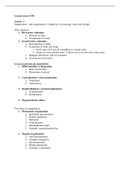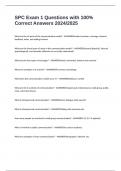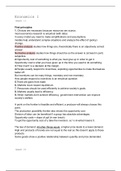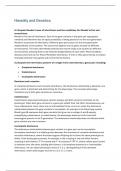Criminology Concept List + Definitions
Crime & Criminology: definitions, biases & assumptions
- In the most simplified way criminology is the study of crime, criminals, and criminal
justice. Biases can occur that relate to yourself (race, gender, etc.) when researching
criminology. Assumptions made about criminology often focus on the science being
solely about serial killers, organised crime, etc.
Positivism (individual vs sociological)
- Positivism within criminology studies what factors contribute to someone committing
crime / becoming criminal. In societal context this refers to societal factors
contributing to someone committing crime (e.g. poverty).
Social Constructivism
- Looks at why social norms exist, and how they have come to exist. ‘What is seen as
crime is a product of the dynamics of a given society’ is a quote best fitting the idea of
social constructivism within criminology.
Marxism (political economy of crime)
- Marx stated that punishment (consequence of crime) serves to maintain state power
and power of the ruling class. Addittionally Marx stated that punishment serves
economics goals of the state via fines. Limitations of the Marxist approach to
criminology is that it is too structural and mostly focuses on fines and imprisonment,
not other types of punishment.
Abolitionism
- Abolitonists argue against imprisonment, and the current form of the criminal justice
system, they focus more on the underlying causes of what makes someome commit
crime.
Punishment: legitimacy to punish & social contract
- The state has a monopoly on the legitimate use of physical force when it comes to
punishments, and executing legal punishments in general. The social contract refers to
Hobbes’ Leviathan, where the people of a nation form a government which server to
protect them. Beccaria adds to this by saying that everyone sacrifices some liberty, the
sum of this constitutes the sovereignity of a nation.
Punitive/welfarist/radical types of punishment
- Punitive imprisonment, fines, etc.
- Welfarist community sentences, probation, etc.
- Radical restorative justice, abolitionalism, etc.
Deterrence (general & special)
, - Punishment should discourage the offender from committing crime (special) and
discourage others to commit crime aswell (general).
Retribution
- Moral justification in punishing a criminal for their crimes, criticised by the Classical
School for being brutal and inefficient
Utilitarianism & rational choice
- Utilitarianism focuses on the idea that punishment should be used to stop offenders
from offending again in the future (recidivism). Rational choice refers to the thought
that in punishment every decision should have an underlying rational choice. E.g. the
cost-benefit analysis where the costs of punishing an individual must be outweighed
by the benefit to society as a whole.
Politics of Law and Order
- Refers to the politics behind crime, and the decision making behind laws and their
goal to create order.
Crime numbers & statistics as currency/baggage/deflection
- Currency crime numbers & statistics can be used as a currency by politicians by
using them to justify new policies for a reduction of crime. Crime policy has impact
on crime numbers.
- Baggage crime numbers & statistics can be seen as baggage as they must be
balanced between meaningful changes and pleasing the public & the media.
- Deflection crime numbers & statistics can be used as deflection to redirect the
publics attention (e.g. from a financial crisis to mass migration)
Attrition & the 3 R’s
- Attrition refers to criminal cases not reaching or processing through the criminal
justice system.
- Recognition recognising a crime, by victims / witnesses
- Reporting reporting a crime to the police
- Recording recording of the crime officially by the police
Assumptions, stereotypes & tropes in crime representation
- Assumptions portraying criminals as ‘visually distinct’, often with tattoos, scars, or
a rough looking appearance.
- Stereotypes e.g. racial stereotyping where often black men are more likely to be
seen as criminal (the overrepresenting of racial groups)
- Tropes the thought that ex-offenders must have the temptation to reoffend and
constantly struggle with it.
Moral panic & deviancy amplification
Crime & Criminology: definitions, biases & assumptions
- In the most simplified way criminology is the study of crime, criminals, and criminal
justice. Biases can occur that relate to yourself (race, gender, etc.) when researching
criminology. Assumptions made about criminology often focus on the science being
solely about serial killers, organised crime, etc.
Positivism (individual vs sociological)
- Positivism within criminology studies what factors contribute to someone committing
crime / becoming criminal. In societal context this refers to societal factors
contributing to someone committing crime (e.g. poverty).
Social Constructivism
- Looks at why social norms exist, and how they have come to exist. ‘What is seen as
crime is a product of the dynamics of a given society’ is a quote best fitting the idea of
social constructivism within criminology.
Marxism (political economy of crime)
- Marx stated that punishment (consequence of crime) serves to maintain state power
and power of the ruling class. Addittionally Marx stated that punishment serves
economics goals of the state via fines. Limitations of the Marxist approach to
criminology is that it is too structural and mostly focuses on fines and imprisonment,
not other types of punishment.
Abolitionism
- Abolitonists argue against imprisonment, and the current form of the criminal justice
system, they focus more on the underlying causes of what makes someome commit
crime.
Punishment: legitimacy to punish & social contract
- The state has a monopoly on the legitimate use of physical force when it comes to
punishments, and executing legal punishments in general. The social contract refers to
Hobbes’ Leviathan, where the people of a nation form a government which server to
protect them. Beccaria adds to this by saying that everyone sacrifices some liberty, the
sum of this constitutes the sovereignity of a nation.
Punitive/welfarist/radical types of punishment
- Punitive imprisonment, fines, etc.
- Welfarist community sentences, probation, etc.
- Radical restorative justice, abolitionalism, etc.
Deterrence (general & special)
, - Punishment should discourage the offender from committing crime (special) and
discourage others to commit crime aswell (general).
Retribution
- Moral justification in punishing a criminal for their crimes, criticised by the Classical
School for being brutal and inefficient
Utilitarianism & rational choice
- Utilitarianism focuses on the idea that punishment should be used to stop offenders
from offending again in the future (recidivism). Rational choice refers to the thought
that in punishment every decision should have an underlying rational choice. E.g. the
cost-benefit analysis where the costs of punishing an individual must be outweighed
by the benefit to society as a whole.
Politics of Law and Order
- Refers to the politics behind crime, and the decision making behind laws and their
goal to create order.
Crime numbers & statistics as currency/baggage/deflection
- Currency crime numbers & statistics can be used as a currency by politicians by
using them to justify new policies for a reduction of crime. Crime policy has impact
on crime numbers.
- Baggage crime numbers & statistics can be seen as baggage as they must be
balanced between meaningful changes and pleasing the public & the media.
- Deflection crime numbers & statistics can be used as deflection to redirect the
publics attention (e.g. from a financial crisis to mass migration)
Attrition & the 3 R’s
- Attrition refers to criminal cases not reaching or processing through the criminal
justice system.
- Recognition recognising a crime, by victims / witnesses
- Reporting reporting a crime to the police
- Recording recording of the crime officially by the police
Assumptions, stereotypes & tropes in crime representation
- Assumptions portraying criminals as ‘visually distinct’, often with tattoos, scars, or
a rough looking appearance.
- Stereotypes e.g. racial stereotyping where often black men are more likely to be
seen as criminal (the overrepresenting of racial groups)
- Tropes the thought that ex-offenders must have the temptation to reoffend and
constantly struggle with it.
Moral panic & deviancy amplification








